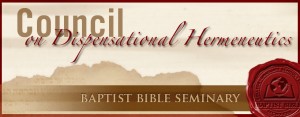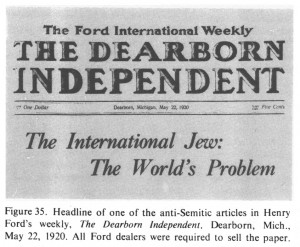Last year with the failed predictions of Harold Camping (once again…and again), we have been reminded by many of the failed prophecies of the past. Many come from the cults (Jehovah’s Witnesses, Seventh-Day Adventists/Millerites). Y2K was extremely revealing and financially profitable for some video makers. There were both Christian and secular alarmists on that one. I have been especially curious about the rise of non-Christian doomsday prophecies that seem to proliferate in our culture — all of them NOT coming from a dispensational premillennial outlook on the rapture of the church. Read the rest of this entry »
Archive for category Dispensationalism
Embarrassment and Prophecy
Jan 26
 Next week is the fourth annual Council on Dispensational Hermeneutics held at Baptist Bible Seminary (Sept. 21-22). Our topic is Dispensationalism and the Holy Spirit. I am a little amazed at the paper proposals that came in. Certainly they are from good men and will tackle special issues such as the baptism of the Spirit. However, there were no papers that dealt strictly with the filling of the Spirit and the debates surrounding Ephesians 5:18-21. Furthermore, there were no papers on cessation of the sign gifts. Perhaps we can come at those issues next year or in later meetings. Elliott Johnson told our steering committee last year that dispensationalists used to own the issue of the Holy Spirit. However, it has come to the place of being neglected in many dispensational circles. The council this year is partly designed to address this problem. Those of you who are traditional dispensationalists, please pray for our meetings as we interact with each other on these important issues.
Next week is the fourth annual Council on Dispensational Hermeneutics held at Baptist Bible Seminary (Sept. 21-22). Our topic is Dispensationalism and the Holy Spirit. I am a little amazed at the paper proposals that came in. Certainly they are from good men and will tackle special issues such as the baptism of the Spirit. However, there were no papers that dealt strictly with the filling of the Spirit and the debates surrounding Ephesians 5:18-21. Furthermore, there were no papers on cessation of the sign gifts. Perhaps we can come at those issues next year or in later meetings. Elliott Johnson told our steering committee last year that dispensationalists used to own the issue of the Holy Spirit. However, it has come to the place of being neglected in many dispensational circles. The council this year is partly designed to address this problem. Those of you who are traditional dispensationalists, please pray for our meetings as we interact with each other on these important issues.
Zeal for Zion
Mar 14
 I have just finished my reading of Shalom Goldman’s excellent book Zeal for Zion: Christians, Jews, and the Idea of the Promised Land (UNC Press). Goldman is professor of Hebrew and Middle Eastern studies at Emory University. I had made an earlier post on it in my earlier stages of reading. While I think there are times when he is off in his assessment of various relationships and his portrayal of various theological views, on the whole he has provided an excellent outline of the historical convergence of Christian forms of Zionism and Jewish forms of Zionism since the late 1800s. Perhaps the primary contribution he makes to the history of Zionism is to show that it is not a monolithic movement. While this has been recognized on the Jewish side, on the Christian side it has been assumed in some circles (popularly?) that modern dispensationalism, which is Zionist by its very nature, is the only Christian form of Zionism. This came home to me a few years ago at the Evangelical Theological Society. Tommy Ice, a dispensationalist responder, pointed out to the main speaker Timothy Weber, that in his analysis (see Weber’s book On the Road to Armageddon) he assumed that all Christian Zionists were dispensationalists, when such is not the case. Goldman’s book helps to support Ice’s conclusion and critique.
I have just finished my reading of Shalom Goldman’s excellent book Zeal for Zion: Christians, Jews, and the Idea of the Promised Land (UNC Press). Goldman is professor of Hebrew and Middle Eastern studies at Emory University. I had made an earlier post on it in my earlier stages of reading. While I think there are times when he is off in his assessment of various relationships and his portrayal of various theological views, on the whole he has provided an excellent outline of the historical convergence of Christian forms of Zionism and Jewish forms of Zionism since the late 1800s. Perhaps the primary contribution he makes to the history of Zionism is to show that it is not a monolithic movement. While this has been recognized on the Jewish side, on the Christian side it has been assumed in some circles (popularly?) that modern dispensationalism, which is Zionist by its very nature, is the only Christian form of Zionism. This came home to me a few years ago at the Evangelical Theological Society. Tommy Ice, a dispensationalist responder, pointed out to the main speaker Timothy Weber, that in his analysis (see Weber’s book On the Road to Armageddon) he assumed that all Christian Zionists were dispensationalists, when such is not the case. Goldman’s book helps to support Ice’s conclusion and critique.
Covenant theologians have long been sensitive to being charged with anti-Semitism. Recall the discussions about the Knox Seminary Open Letter and my response to it which can be found here in the eschatology section of the drop-down menus (click on systematic theology to get to eschatology). However, it seems that dispensationalists are also occasionally charged with being anti-Semitic. Apparently, no one in the evangelical world is immune to the charge.
Often I see the name Arno C. Gaebelein come up in such disucssions. I am well-versed in Gaebelein’s life and work since I did my Ph.D. dissertation on him. But I continue to be amazed at the misinformation that is broadcast about him on many fronts, including his attitudes about Jews. To be sure, in my dissertation I analytically criticize him on many fronts as any dissertation writer would do. In my case, it was a focus on Gaebelein’s theological method although I also get into the life influences upon Gaebelein and his attitudes about the Jews.

